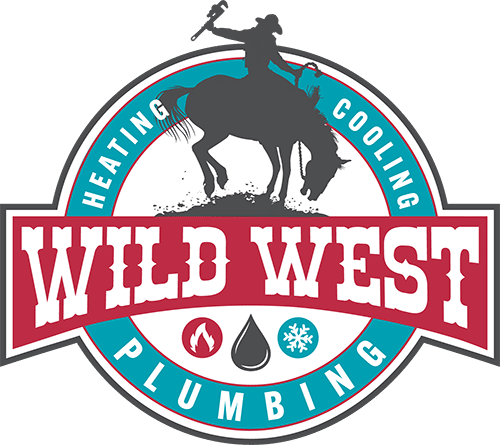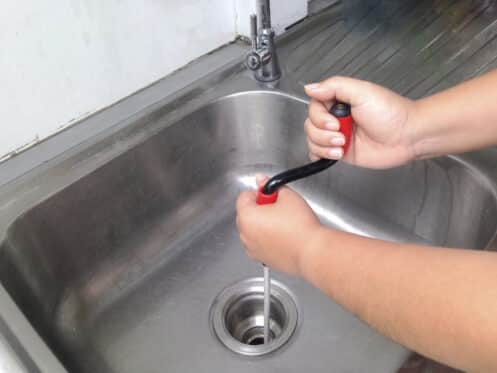The sink is the unsung hero of the kitchen. This structure plays an important role in every task from food prep and cooking to tidying. Given the importance of the kitchen sink, foul smells from this area are both off-putting and embarrassing. Even worse, bad smells can also indicate underlying safety hazards. But what causes a bad sink odor, and what can you do about this occurrence? A look at the primary reasons behind stinky sinks can provide guidance on the best strategy to rectify the issue.
What Causes a Kitchen Sink to Smell?
Reasons for kitchen sink odors vary in severity. The most serious causes of bad kitchen sink smells include clogged sewer lines, clogged sewer vent pipes, P-trap problems, bacteria growth, or mold and mildew.
Clogged or Damaged Sewer Lines
When you rinse used water down the kitchen sink, the waste eventually flushes away into the sewer line. However, any blockage or clogs within the sewer line can obstruct the line from completing its job. Furthermore, problems like ruptures or leaks within the sewer line can also stop the system from successfully eliminating waste. If the system malfunctions for too long, harmful fumes can begin to rise back up through your drain and emit from the sink. These fumes not only smell bad, but they are also a toxic health hazard. Sewer gases can exacerbate respiratory problems in the elderly, children, or people with compromised immune systems. It is important to allow a trained plumber to conduct drain repairs to protect the safety of your family.
Clogged Sewer Vent Pipe
The sewer vent is a vertical pipe that helps expel sewer or septic fumes from your home. Most local codes require this vent to remain open at least four inches to direct toxic air away from the house. If this vent becomes blocked or obstructed, however, the sewer gas cannot exit your drain line. Instead, the fumes get forced back into your drains, eventually seeping up through your sink. If you smell the stench of rotting garbage from your sink for no apparent reason, a malfunctioning sewer vent pipe is a likely culprit. Fixing a clogged or broken vent pipe requires the help of a trained professional.
Rotting Food
Rotting food is another cause of unpleasant sink odors. Organic particles left in the drain eventually start to decompose or decay and emit foul smells. Food particles can also contain grease and oils that eventually solidify and attach to the walls of pipes beneath your sink. These congealed masses of grease and oils can then trap other debris and cause bad smells.
Dry P-Trap
The P-trap is a curved or p-shaped section located under your drain. Other names for the P-trap include the drain trap, U-bend, or U-trap. Any fixture connected to your plumbing network has this structure. The purpose of the structure is to “trap” solids that might have otherwise flowed into your main plumbing system and clogged the drain line. For this reason, individuals who have lost jewelry or other items down the drain are often thrilled when belongings merely stop in the p-trap instead. Even more importantly, the shape of the p-trap means that it should hold water at all times. This water acts as a buffer that helps prevent sewer gasses and other wastewater odors from re-entering the home. If the water evaporates or the P-trap otherwise dries out, however, toxic fumes can start to seep back into the house.
Mold or Mildew
The dark and moist environment of the kitchen drain can create the perfect habitat for mold or mildew growth. Undetected leaks can also cause mold growth on any wooden cabinetry beneath the kitchen sink. A telltale sign of mold growth is a persistent musty or sour smell. Since floating mold spores can cause respiratory problems, it is important to reach out to a plumber to fix drain issues and stop the spread of mold.
Bacterial Growth
Bacteria can also thrive in the damp environment of a kitchen sink or drain. These organisms can produce unpleasant odors as they feed on any food scraps that make it down your drain pipe. Bacterial colonies can also live in clogs found deeper within the plumbing.
Sulfate Buildup
If your kitchen sink has a rotten egg smell, the odor could result from an excessive amount of sulfate in the water. Too much sulfate may cause unpleasant smells as well as foul-tasting water that stains clothes or dishware. A plumber may be able to perform water treatments to bring sulfur content down to more reasonable levels.
Garbage Disposal Problems
Inefficient garbage disposals can also cause foul odors. If the garbage disposal malfunctions or the impeller fails to pulverize food completely, the unit can accumulate sludge that eventually creates a stench in the kitchen. A plumber may need to troubleshoot the unit or replace it if you have had the device more than 10 years.
What Can You Do About Bad Sink Smells?
The first step for eliminating bad sink smells is to schedule sewer inspection or repair. Since sewer smells are among the more common and most serious causes of kitchen sink odor, reach out to a plumber to contact a video inspection and determine if a sewer line clog or sewer vent damage is to blame. Plumbers have commercial-grade equipment like plumbing snakes or augers that can help remove moderate sewer problems such as obstructions or clogs. They can also help with more severe issues like blockages within venting pipes.
While it may feel tempting to pick up drain cleaner from the hardware store and pour it down your sink, you should never attempt to address sewer problems on your own. Commercial drain cleaners contain harsh, abrasive chemicals that can weaken the walls of your pipes and compromise the quality of your home water supply. These chemicals can also damage sewer lines and worsen problems and undermine the balance of septic systems. Plumbers have the tools necessary to fix problems without introducing unwanted chemicals into your piping network.
In addition to the best equipment, plumbers also bring the right protective gear and experience needed to safely handle sewer or septic issues without exposing your family to harmful bacteria. Along with sewer repair, a plumber can also conduct professional drain cleaning and check for other sources of unpleasant smells like bacteria or mold. Finally, another important step is to allow plumbers to check for leaks and to safely remove sewer gasses that may have already seeped into your home.
Contact Us Today
Sink odors can disrupt the quality of life and pleasant ambiance of your home. These smells can also signify sewer problems that can have unexpected health consequences for your family. Fortunately, Wild West Plumbing, Heating & Cooling offers sewer repair services in Kalispell, MT and surrounding areas. Our plumbers can fix sewers lines and eliminate foul smells in your kitchen. We also provide sewer vent repair and drain cleaning that helps preserve the lifespan of your plumbing system.
By fixing sewer and septic problems early, our experts can also help protect your home foundation and floors from potential emergencies like sewer leakage or flooding. Avoid the horrible risk of sewage backing up into your toilets or fixtures by contacting us instead. In addition to sewer repair, we offer leak detection to find unseen pipe damage and hydro-jetting to remove corrosion or buildup. We offer routine servicing of water heaters as well as filtration or softening treatments to ensure superior indoor water quality.
Contact Wild West Plumbing, Heating & Cooling today for all of your plumbing needs.


